Accelerate Productivity in 2025
Reignite Growth Despite the Global Slowdown
The legal industry is rapidly evolving by leveraging technology advancements to overcome the challenges of increased workflows and productivity demands. Legal departments face increasing pressure to efficiently administer data-intensive processes. Historically, considerable time and resources were spent on recording, filing, and handling client information. Hence, startups increasingly develop innovative tools to help law firms and institutions improve efficiency, reduce costs, and provide high-quality services to their clients. The most significant legal technology trend is legal case management software to manage cases end-to-end. Disruptive technologies such as artificial intelligence (AI), advanced computing, and immersive technologies also impact the industry, enabling lawyers to optimize their processes and decision-making. In this data-driven report, you get to explore the top 10 trends and 20 innovative startups impacting the legal industry.
Innovation Map outlines the Top 10 Legal Technology Trends & 20 Promising Startups
For this in-depth research on the Top 10 Legal Technology Trends & Startups, we analyzed a sample of 1675 global startups & scaleups. This data-driven research provides innovation intelligence that helps you improve strategic decision-making by giving you an overview of emerging technologies in the legal industry. In the Legal Technology Innovation Map below, you get a comprehensive overview of the innovation trends & startups that impact your company.
These insights are derived by working with our Big Data & Artificial Intelligence-powered StartUs Insights Discovery Platform, covering 3 790 000+ startups & scaleups globally. As the world’s largest resource for data on emerging companies, the SaaS platform enables you to identify relevant technologies and industry trends quickly & exhaustively.
Tree Map reveals the Impact of the Top 10 Legal Technology Trends
Based on the Legal Technology Innovation Map, the TreeMap below illustrates the impact of the Top 10 Legal Tech Trends. Startups are developing solutions to simplify the management of complex legal cases and streamline workflows. Legal case management is the largest growing trend in the industry. Litigation management tools also have a significant impact on legal industry trends. Such tools improve efficiency, track the progress of legal cases, and manage associated costs for law firms. Further, virtual legal assistants enable law firms to focus on more complex and high-value tasks by automating administrative tasks. Identity management and data protection are also vital trends that protect client confidentiality from cybersecurity attacks. Besides these legal tech trends, there are a growing number of startups working on automated document review, smart contract management, immersive technologies, and advanced computing for the legal industry.
Top 10 Legal Technology Trends in 2023
- Legal Case Management Software
- Litigation Management
- Virtual Legal Assistants
- Identity Management
- Client Data Protection
- Robotic Process Automation (RPA)
- Automated Document Review
- Smart Legal Contract Management
- Immersive Technology
- Advanced Computing
Global Startup Heat Map covers 1675 Legal Tech Startups & Scaleups
The Global Startup Heat Map below highlights the global distribution of the 1675 exemplary startups & scaleups that we analyzed for this research. Created through the StartUs Insights Discovery Platform, the Heat Map reveals high startup activity in Europe, followed by the US and India. Below, you get to meet 20 out of these 1675 promising startups & scaleups as well as the solutions they develop. These legal tech startups are hand-picked based on criteria such as founding year, location, funding raised, & more. Depending on your specific needs, your top picks might look entirely different.
Top 10 Legal Technology Trends in 2023
1. Legal Case Management Software
Manually processing documents and data in a legal case has always been complex and challenging. Emerging technologies are changing how lawyers process, organize, and manage their cases. Startups and scaleups design highly customizable, secure, and affordable cloud-based case management applications to boost the productivity and profitability of law firms. New legal technology designs allow lawyers to quickly identify and respond to changing circumstances, while simultaneously reducing time and resources spent. Finally, this dominant legal tech trend enables law firms to provide efficient services to their clients and ultimately improve the quality of legal case services.
ECFX develops Legal Notice Management Software
US-based startup ECFX offers management software that automates the processing of electronic court filing (ECF) notices. The solution streamlines the entire legal notice process, from drafting to filing by ensuring compliance with all the relevant laws and regulations. Processing ECF manually is costly, time-consuming, and results in delays. The ECFX Notice uses intelligent automation to automatically process all notices and eliminate repetitive and duplicative tasks. This enables law firms to dedicate their human resources to more value-added tasks.
LegalE specializes in Legal Case Management
Indian startup LegalE offers a cloud-based case management platform that allows law firms to streamline their operations and organization. The platform provides a secure repository to track all the court cases and documents in a single place. Moreover, LegalE allows law professionals to easily access information regardless of location, generate reports and track progress in court cases. This solution is designed to improve efficiency, reduce costs, and ensure data security.
Clarra offers Cloud-based Case Tracking Software
US-based startup Clarra builds a cloud-based application to simplify case and resource management. This solution improves the efficiency and visibility of case management. It helps law firms manage and track matters, events, and case-related expenses. Clarra helps law firms manage complex details, eliminate errors, save time, collect fees faster, and optimize resources. Additionally, the startup’s case-tracking software reduces the amount of time spent on tracking deadlines and processing documents.
2. Litigation Management
Monitoring all the activities in a contentious proceeding, including deadlines, court dates, and other relevant information, is quite challenging and time-consuming. Therefore, emerging trends such as litigation management software help track, organize, and schedule daily activities related to litigation cases and court hearings. Startups provide innovative solutions for law firms and legal departments to efficiently manage caseloads and resources. Moreover, it offers access to general information such as the status of the case, the lawyers involved, and deadlines. Litigation management solutions allow lawyers to easily share data, interact with their clients from anywhere and facilitate efficient collaboration within legal teams.
Uncover Legal develops Litigation Management Software
Uncover, based in the Netherlands, offers litigation management software that combines AI, natural language processing (NLP), and deep learning. The startup’s technology allows lawyers to save valuable time, drive efficiency and focus on strategic tasks. By leveraging AI, the startup creates an organized set of documents to automatically generate a timeline of relevant events. As a result, legal team members gain more time every day to focus on the most challenging aspects of their cases.
Litigaze streamlines Litigation Risk Management
Australian startup Litigaze builds a litigation management platform that uses an intuitive visual mapping system. The startup’s solution enables lawyers to visualize opportunities and risks for any complex litigation. As a result, legal teams make more confidential data-driven litigation decisions on whether to settle or pursue litigation. Further, it allows legal teams to better identify, communicate, and evaluate litigation risks and uncertainties.
3. Virtual Legal Assistants
The use of virtual legal assistants (VLAs) is a growing trend that revolutionizes law firm operations. Startups leverage AI and NLP to automate legal processes and provide real-time support for legal matters. These virtual assistants understand legal language and provide tailored legal advice quickly and cost-effectively. By reducing the amount of time it takes to respond to inquiries, it allows human assistants to focus on high-value tasks that require a more human touch. Moreover, this emerging technology helps law firms manage their client interactions, create contracts, and automate tasks such as legal document drafting, research, and filing.
KLoBot builds Legal AI Chatbots
US-based startup KLoBot develops a legal AI chatbot builder platform with machine learning capabilities. The platform enables legal firms to design text and voice-based chatbots within minutes. Chatbots built on KloBot’s platform assist law firms in performing a variety of tasks such as answering questions and replying to knowledge repository search queries. Moreover, the chatbots perform activities including scheduling meetings, setting up reminders, and completing tasks on behalf of attorneys. KloBot-enabled chatbots act as personal assistants to lawyers and simplify internal and external communications.
Codefy offers an Intelligent Virtual Assistant
German startup Codefy offers an intelligent knowledge assistant to help law firms master complex proceedings, save time, and increase profitability. Codify provides an intelligent search feature that enables legal teams to quickly find the most relevant content. Moreover, these virtual assistants support layers in executing key processes, such as contract drafting, contract review, litigation, and dispute resolution. Codefy’s solution helps alleviate the large volume of claims suffocating the courts by enabling an automated production of lawsuits.
4. Identity Management
Identity management is an emerging legal tech trend that secures access control of digital identities and authentication for law firms. Startups provide solutions to secure and manage user identity, as well as access rights and track user activity for security and compliance purposes. Thus, these solutions help law firms detect unauthorized activity and protect against data breaches. Further, law firms use biometric authentication, such as fingerprint scanning or facial recognition, to secure access to legal documents or other critical data. In addition, through efficient identity verification, lawyers save substantial amounts of time in onboarding clients.
Verify 365 enables Identity Verification
Verify 365 is based in the US and offers digital ID verification software to prevent identity theft and ensure regulatory compliance. The startup uses near-field communication (NFC)-based biometric checks to complete fast and efficient digital verification and authentication. Verify 365’s software easily verifies the identity of users using facial recognition and enhanced cryptography technologies. As a result, legal teams complete their client onboarding processes within just a few minutes.
Mirror Identity specializes in Biometric Identification
UK-based startup Mirror Identity offers a biometric identification platform to complete client identification and anti-money laundering (AML) checks electronically. The platform helps law firms save time, increase efficiency, and improve front-line security. Further, this solution enables the completion of clients’ onboarding processes in a matter of minutes while adequately and securely verifying clients. Hence, the technology contributes to reducing the risk of identity fraud or money laundering and protects law firms’ reputations.
5. Client Data Protection
The legal industry is increasingly reliant on sensitive data and confidential information. Therefore, the adoption of new technology increases concerns regarding data security and privacy. Legaltech startups provide solutions to address significant risks such as cybersecurity threats and data breaches. Moreover, this growing trend allows law firms to ensure that client data is protected from unauthorized access and modification. Startups and scaleups offer e-signature solutions to enable legal documents to be signed electronically while ensuring compliance with data protection laws and regulations. Additionally, legal departments and law firms are investing more in cybersecurity measures such as data encryption and user authentication.
heyData offers General Data Protection Regulation (GDPR)-as-a-Service
heyData is a German startup that builds a data protection platform to enable small and medium-sized enterprises (SMEs) to achieve GDPR compliance. The platform combines smart GDPR management software with legal data protection expertise. Hence, the solution allows law firms to save time and resources while fulfilling all the compliance requirements. Moreover, heyData provides a secure data protection cloud, where all the essential documents generated by the system are securely stored in a digital document vault. The technology allows legal teams to streamline data management processes, reduce non-compliance risk, and ensure data privacy for their clients.
Twala develops a Blockchain-based eSignature platform
Twala, based in the Philippines, builds a blockchain-based e-signature platform to digitally transform contract workflows and ensure the highest security and privacy throughout the entire contract management process. The startup’s digital signature technology protects the authenticity of all documents, making them court-admissible. Twala helps law firms mitigate fraud risks since all the documents signed within the platform are independently verifiable and tamper-proof.

6. Robotic Process Automation (RPA)
Robotic process automation is an innovative technology that utilizes software to automatically execute repetitive and time-intensive tasks associated with legal processes. Startups are increasingly adopting RPA to help legal departments manage daily administrative procedures. Legal RPA bots have the capability to read contracts, perform checks, implement contract terms, and analyze records across multiple systems accurately. This technology enables lawyers and assistants to shift the focus toward higher-value tasks, thus reducing operational costs. RPA automates a variety of processes with the aim of alleviating operational pressure, mitigating risk, and ensuring legal compliance.
IntelliBuddies enables RPA-driven Legal Task Automation
US-based startup IntelliBuddies builds a platform that combines RPA, business process automation, and machine learning (ML) to help law firms to create, deploy, and analyze legal processes. The startup’s product, buddies, automate manual contract-related tasks and generate reports in real-time to allow legal teams to identify patterns and manage potential risks. Further, this solution makes the legal processes easy and convenient by allowing lawyers to focus on other core objectives.
Authenticity.ai builds Legal Transcription Automation Software
US-based startup Authenticity.ai employs artificial intelligence and human transcription to efficiently convert legal proceedings recordings into fully formatted transcriptions. Hence, law firms create legal transcripts with automated speaker IDs from recordings that can also be translated into different languages. In addition, this solution allows lawyers to store and search transcripts in the cloud. Authenticity.ai’s technology uses audio and video recognition to create transcripts and increase efficiency for legal teams.
7. Automated Document Review
Automated contract review is an emerging legal tech trend that uses ML algorithms to automatically review legal contracts. The use of automation mostly applies to document review, e-discovery, and legal research. Automating manual, repetitive, and time-intensive processes enables lawyers to focus more on the core strategic tasks. As a result of document review automation, legal teams handle large volumes of contracts. Moreover, startups provide solutions to quickly identify the relevant information within a document, flag inconsistencies, spot human errors, and reduce the costs associated with manual review. Overall, this legal tech trend is transforming the industry by improving efficiency and accuracy while reducing costs.
Amikus AI specializes in Automated Contract Review
Indian startup Amikus AI develops an AI-powered platform to accelerate legal contract drafting and review. The startup uses automation and templates created by legal experts to draft contracts faster. Further, the platform analyzes the contracts and provides valuable insights allowing legal professionals to focus on more relevant clauses. In addition, as part of the contract review, it is challenging to decide which clauses are problematic and unacceptable. This solution serves as a personal review assistant to flag risks and provide alternate wording for clauses.
CoreCLM provides Automated Contract Intelligence
US-based startup CoreCLM provides an automated contract intelligence platform for contract review, contract comparison, and metadata extraction. This solution enables legal professionals to extract clauses from draft contracts for risk and compliance reviews. Moreover, CoreCLM’s technology allows for the extraction of clause metadata from multiple contracts to provide quick insights and enhance decision-making. Using the platform, law firms significantly reduce the time spent on conducting contract reviews.
8. Smart Legal Contract Management
Smart legal contract management is changing how law firms manage legal contracts. Legaltech startups combine technology with contract management to improve the efficiency and security of managing contracts. Traditional contract management is time-consuming and bears the risk of non-compliance, lack of transparency, limited access to contract data, and inefficiency in contract negotiations. Therefore, this growing trend enables law firms to save time and ensure compliance through automated contract monitoring and notifications. Startups offer solutions to automate contract negotiation processes, analyze contracts for non-compliance, generate templates, and draft documents. Additionally, smart contract solutions offer a centralized repository for contract data, thus making it easily accessible.
InkPaper specializes in Smart Contract Workflow
US-based startup InkPaper develops a contract workflow management platform aiming to make legal contracts smarter. This solution is designed for law firms to enhance the efficiency, consistency, and cost-effectiveness of executing contracts. The platform offers an all-in-one solution for contract review, drafting, and e-signatures. Further, by providing real-time performance data, insights, and suggestions, InkPaper enables law firms to improve their efficiency.
Quant LegalTech develops Contract Lifecycle Management (CLM) Software
Indian startup Quant LegalTech offers a cloud-based CLM software to easily and securely track, monitor and manage legal contracts. The startup helps law firms to solve inefficiencies and deal with the issue of rising compliance complexity. The platform allows legal teams to create, store, manage, and analyze contracts, whilst providing real-time insights to ensure compliance and mitigate risks.
9. Immersive Technology
As the legal industry becomes more tech-driven, virtual and augmented reality (VR/AR) will play an increasing role in law firms. Such immersive tools enable users to create immersive courtroom simulations allowing lawyers to practice their arguments. In addition, this technology is used for training purposes as it creates realistic simulations of legal environments or scenarios. Moreover, VR and AR facilitate negotiation sessions involving avatars interacting with each other in a simulated environment. Thus, this reduces face-to-face meetings and improves efficiency in dispute resolution. Further, immersive technologies are a powerful tool for creating more efficient, cost-effective, and personalized legal services.
Just Legal VR offers an Immersive 3D Courtroom – LINK NOT WORKING
US-based startup Just Legal VR uses virtual reality technology to bring legal actors together in an immersive 3D courtroom. The technology uses custom avatars and AI to create an interactive courtroom experience, allowing lawyers to present their cases in a more engaging way. Just Legal VR enables judges to make their decisions in the virtual courtroom too, avoiding the need for physical court presence. This solution enables legal professionals, law firms, and students to gain valuable courtroom experience and prepare for real-world cases. Moreover, the solution provides users with access to legal documents and evidence enabling lawyers to easily prepare their cases in advance.
10. Advanced Computing
Cloud computing has become an essential tool for law firms, allowing them to store and access data from any location and effectively collaborate with clients. Cloud-based solutions enable law firms to maintain a centralized and secure repository of sensitive data in a scalable and resilient manner. Moreover, advanced computing enables legal teams to quickly and accurately search through extensive amounts of legal data and documents to find relevant information. With the use of computing solutions, law firms build faster applications and offer clients a secure experience. Startups develop cloud-based applications to enhance the cost-effectiveness, efficiency, and mobility of legal teams and capacities.
Merlin Search Technologies offers Integrated Search Cloud Software
US-based startup Merlin Search Technologies combines AI and cloud computing to simplify reviews and make search smarter, more secure, and affordable. Its integrated search cloud software assists legal teams in managing investigations, early case assessments, and other cases that involve large quantities of documents. This software seamlessly integrates keywords and algorithmic search to help legal departments find relevant documents faster, easier, and more cost-effectively.
ModuLegal makes a Cloud Legal Communication Platform
ModuLegal is based in Israel and offers a cloud-based legal communication platform for streamlining legal services and communication processes. The legal communications engine enables the automatic collection of the required information from clients for the preparation of a legal document. In particular, information is gathered in a chat-like experience, while automatically incorporating it into the legal document draft. Further, this solution makes it simple to effectively communicate with clients while also decreasing lawyers’ work time. In addition, Modulegal ensures that legal services are delivered in a fully digital and interactive manner.
Discover all Legal Technology Trends, Technologies & Startups
Legal services involve high costs, inefficiency, and complexity in document and data management. To address these challenges, startups develop virtual assistants, RPA, and document automation to simplify legal processes. The future of legal tech is promising with further advancements in AI, NLP, and machine learning – leading to increased access to legal services, improved risk management, and more informed decision-making. Additionally, technologies such as blockchain, cybersecurity, and cloud computing will also transform the way the legal industry works. Further, staying up to date with the latest legal tech trends remains critical for law firms to provide the best services to their clients. The legal tech trends & startups outlined in this report only scratch the surface of trends that we identified during our data-driven innovation & startup scouting process. Identifying new opportunities & emerging technologies to implement into your business goes a long way in gaining a competitive advantage.
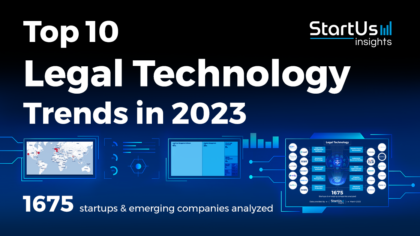
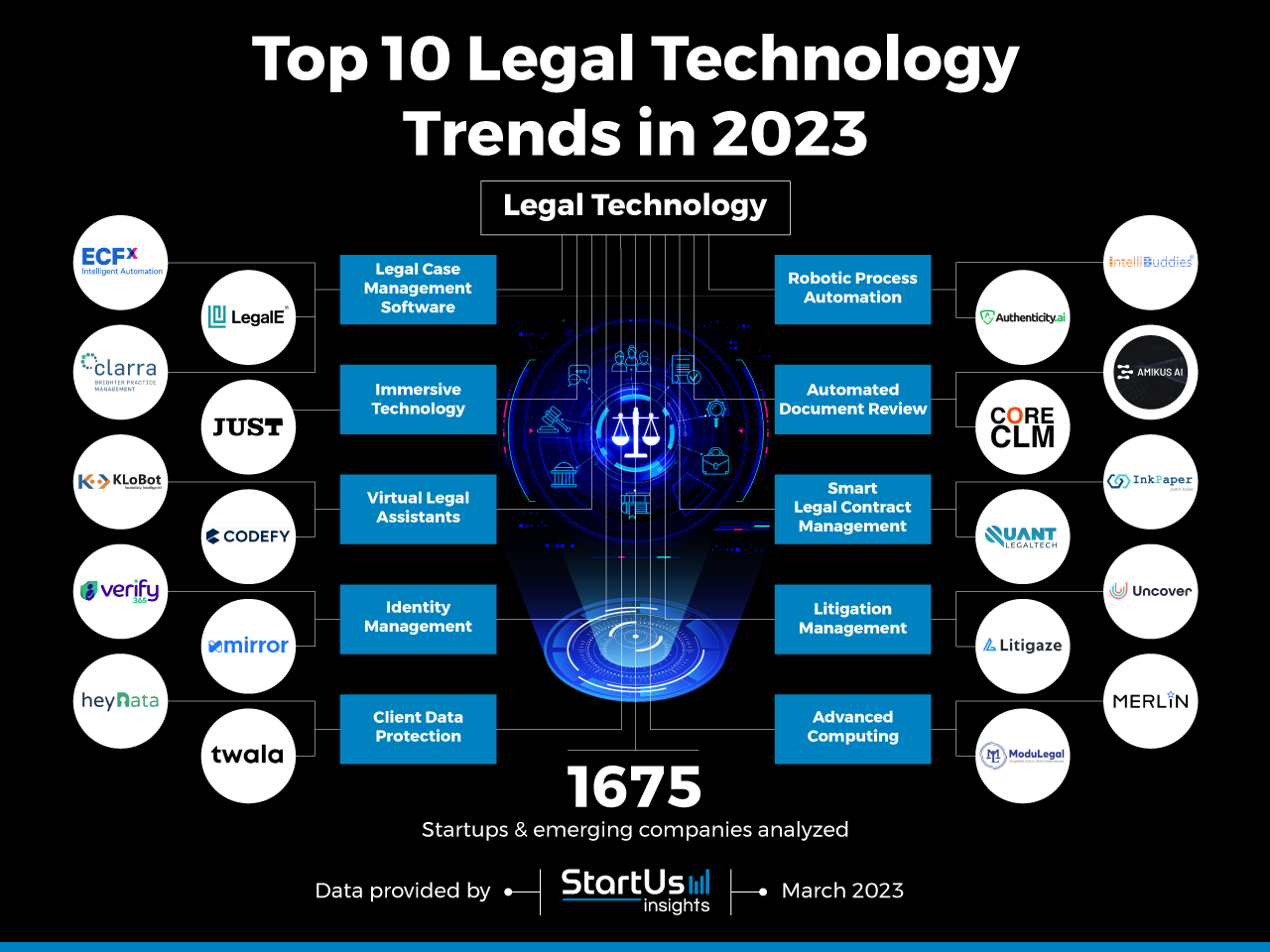
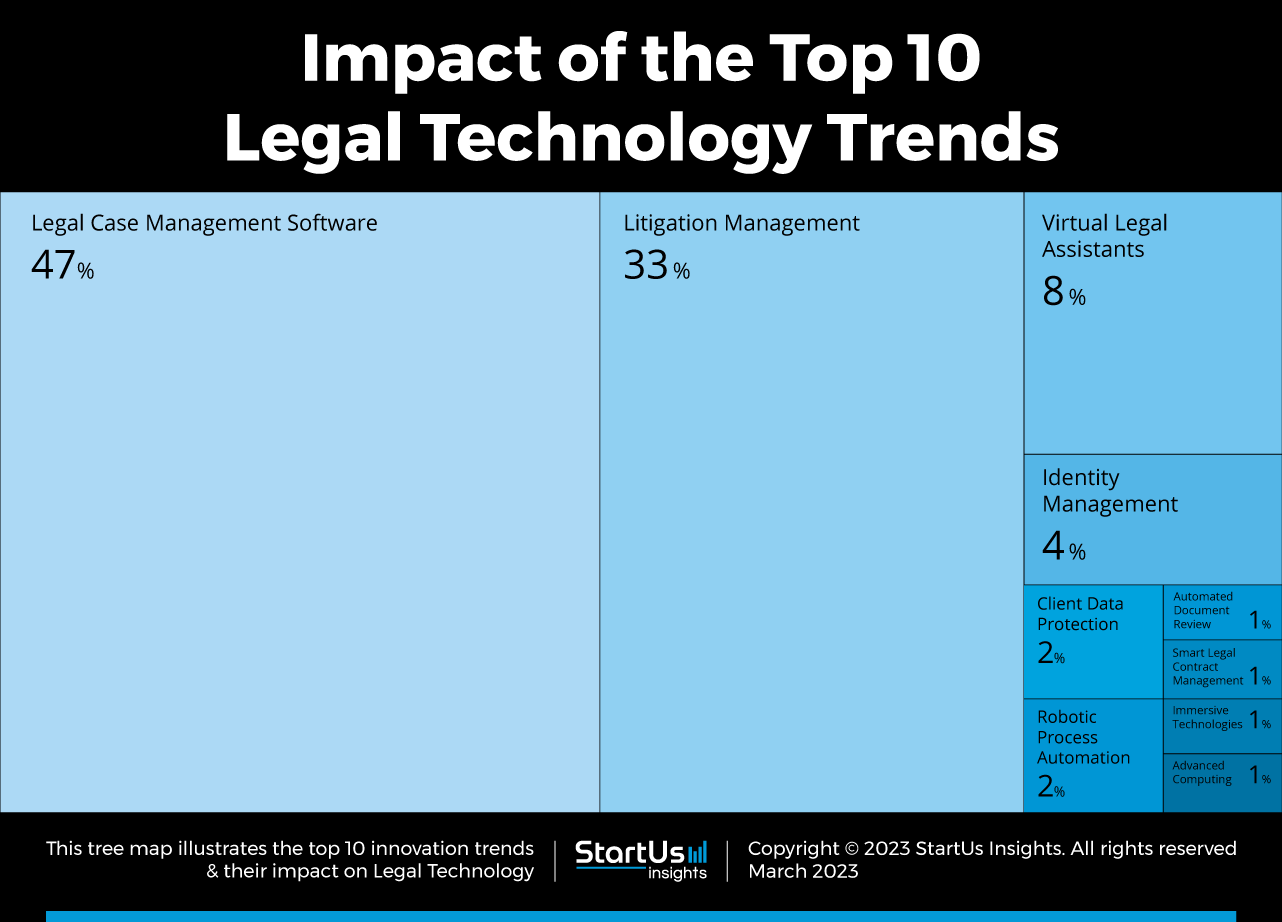
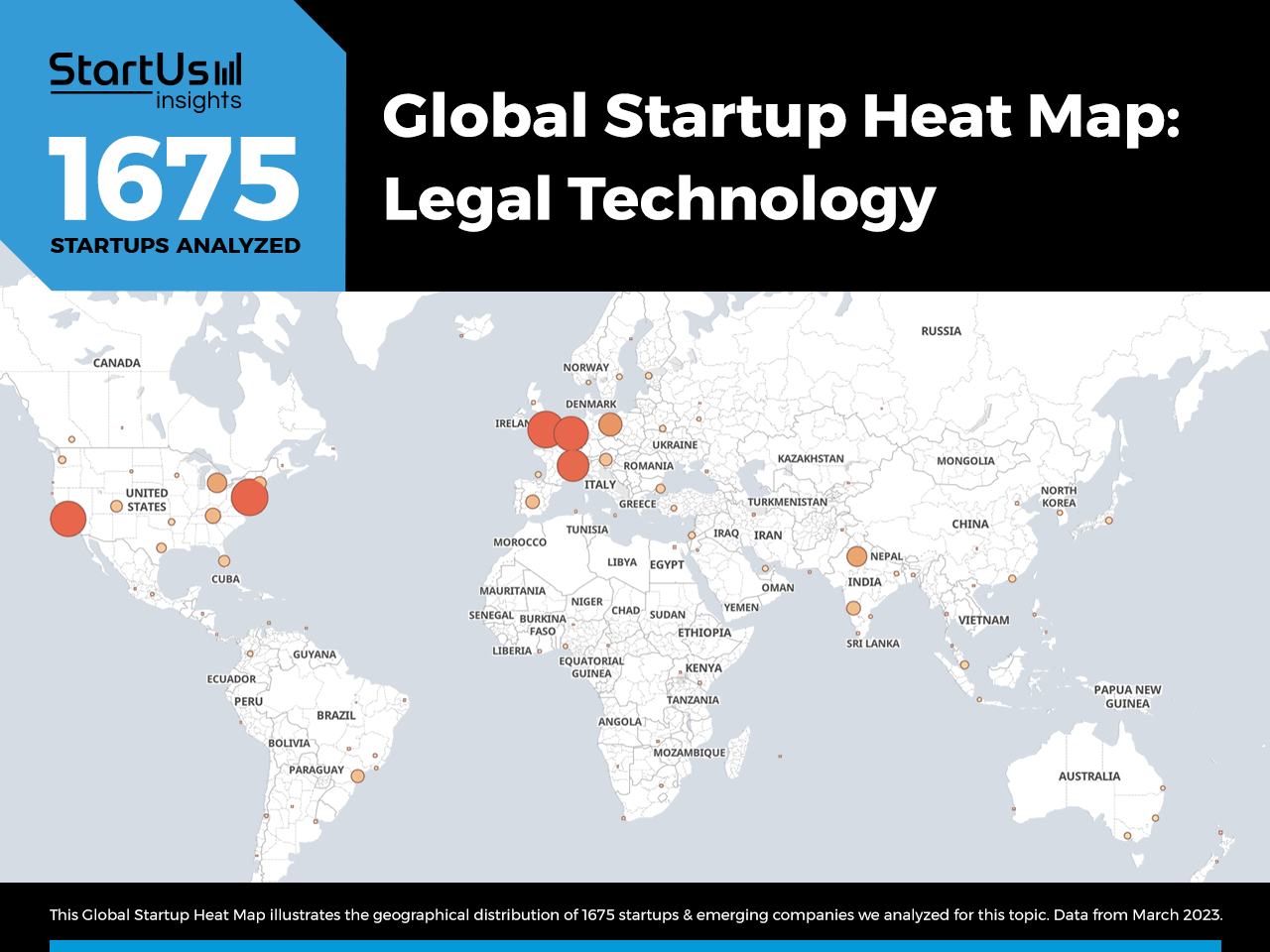
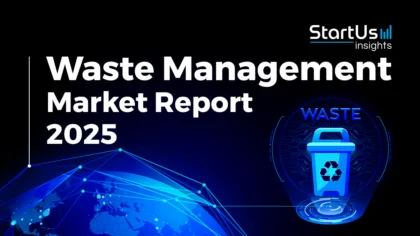
![Explore the 10 Emerging Smart City Trends [2025-2030]](https://www.startus-insights.com/wp-content/uploads/2025/06/Smart-City-Trends-SharedImg-StartUs-Insights-noresize-420x236.webp)




